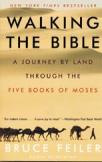A Sacred Trek
For an on-the-ground feel for the Holy Land and the high stakes it holds for the world’s three great religions, Judaism, Christianity and Islam, Bruce Feiler’s book, Walking the Bible, is the next best thing to being there.
The journalist-author takes readers on a guided tour of the first five books of the Bible, called the Pentateuch. With the help of anthropologists and biblical scholars, he shares his insights on why the land is the spiritual center for those who have lived there in the past and for those who live there now. In this way he also invites readers into different scholars’ historical and scientific arguments over the Bible’s authenticity. When it comes to faith, however, readers learn that research is interesting but irrelevant, because the Bible is the story of God’s covenant with his people.
Since the covenant is focused on the land, land is the focal point of the book. Feiler explores key historical places like Mount Ararat in eastern Turkey, where Noah’s ark lands after the flood. He traces Abraham’s journey from Ur in the Tigris-Euphrates river valley to Shechem and Hebron, where he went to sacrifice his son, Isaac. (Muslims believe Abraham’s hometown was Sanliurfa near Haran, northwest of Ur.) Feiler follows Jacob in his travels throughout the land, Joseph’s banishment into Egypt and Moses’ journey out. He treks across the Red Sea, through the Sinai and into the desert where the Israelites wandered for 40 years. Finally, he spends the last night of his journey as Moses did on Mount Nebo, which overlooks the Promised Land.
Most poignant is Feiler’s description of the wilderness as a spiritual foundry, which shaped the ancient Israelites into a people at a time when they did not have a homeland. In the desert Feiler himself experienced the underlying, raw human emotion involved in being in a stark place, confronting the limitations of one’s upbringing, and trying to forge a new identity in the midst of a difficult, transforming journey. The desert journey is the heart of the five books of Moses, Feiler says, because it was there that the Israelites learned it was not enough for individuals to have a relationship with God. God wanted a covenant with the whole community.
Like any good travel guide, Feiler provides readers with helpful tips for navigating the country. With his characteristic and refreshing humor, he describes the local custom of baksheesh, the giving of a small offering, by which he gained entry into many off-limits places. As a result, readers, too, benefit from baksheesh.
Modern-day security is the most obvious concern in a visit to Israel, but Feiler offsets this drawback by showing how the people he meets are committed to the land because of the spiritual pull that gives you energy to put up with what you have to put up with, as one resident tells him.
Feiler’s descriptions of the desert, mountains, rivers and cities provide readers with a sense of place that illustrates the sacredness of the land. Israel, his guides tell him, is like an onion with layers upon layers of history. At its heart are the people living on the land, creating, dying. Being.
Equally interesting is Feiler’s realization that Israel’s cultural heritage developed in relationship to the landand to surrounding nations, from which it adopted their best cultural elements. The author admits, for example, that he had always thought of Egypt as the wicked tyrant over Israel. After interacting with modern Egyptians and studying the hieroglyphics of their ancient buildings, however, he discovers that the Israelites’ aptitude for storytelling, the narrative style of the Pentateuch, was influenced by the Egyptians.
Mesopotamia also influenced Israel’s sensitivity to the role of water in life. In this arid, seemingly lifeless place, it is the Near Eastern gods who establish the concept of contract: they provide water and sustenance in exchange for the people’s worship and faithfulness. Contract is the basis of God’s covenant relationship with the Israelites.
Feiler’s two-year trek in the Holy Land also helped him realize, like Jacob, that his experience of a monotheistic God was not by touching him, imagining him, or seeing him but by walking with him. This is why the land that was the ancient crossroads of trade, travel, conflict, and cultural exchange remains that today for Judaism as well as Christianity and Islam.
Given the current political turmoil in the region, it may be difficult to follow in the author’s footsteps for a visit there, but perhapsas God did for Moses, who never entered the Promised LandGod still grants the believer, and the reader, a prophetic vision. As Feiler says: At the end, [Moses] wasn’t even looking at the land. He was looking where we should look. [Moses] was looking at God.
Walking the Bible provides unique insight and a fuller understanding and appreciation for the Five Books of Moses. The author’s pilgrimage to the Promised Land becomes his own faith-filled connection to the Bible he has been reading all his life, as well as to his Jewish ancestors whose faith in God made the book possible.
This article also appeared in print, under the headline “A Sacred Trek,” in the February 17, 2003, issue.








